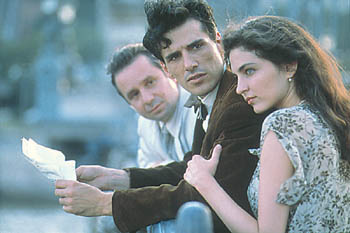![[Metroactive Movies]](/movies/gifs/movies468.gif)
[ Movies Index | Show Times | Silicon Valley | Metroactive Home | Archives ]

Budapest Triangle: Joachim Kröl (left), Stefano Dionisi and Erika Marozsán get together on the eve of war in 'Gloomy Sunday.' Suicide Solution 'Gloomy Sunday' is a well-appointed tale of romance in Budapest before the big war YEARS BEFORE Judas Priest was offering impressionable fans a "Suicide Solution," there was a mid-1930s song titled "Gloomy Sunday," popularly known as the "Hungarian Suicide Song." Suicide is endemic in Hungary. The Hungarians are tormented by the sorrows of history, the intricacies of a non-Romance language and the cinema of Bela Tarr. But "Gloomy Sunday" was rumored to be too much even for the Magyars, who killed themselves in droves upon hearing it. The song's infamy is explored on snopes.com, where we also learn that "Gloomy Sunday" was composed by Rezso Seress, who defenestrated himself--but not till 56 years after the song was a hit, which means that blaming his death on the deadly spell woven by "Gloomy Sunday" is a bit thick. In any case, the song was popular worldwide. Paul Robeson's version will drain the mirth out of you faster than Jim Belushi can. But is "Gloomy Sunday" sadder than Nico's version of "These Days"? "One Kind Favor" by Blind Lemon Jefferson? Joy Division's' "Passover"? Joni Mitchell's "Down to You"? Sad-song experts disagree. One robust argument against suicide is the splendidly built Erika Marozsán, a violet-eyed ringer for the young Elizabeth Taylor. Her frequent bathtub scenes in director Rolf Schübel's new film, Gloomy Sunday, answer the implicit question: How does a Hungarian movie called Gloomy anything hope to appeal to today's sugar-fed film audience? In Budapest between World War I and II, a situation unfolds such as might have interested Ernst Lubitsch. László (Joachim Król), a busy cafe owner, has a young mistress named Ilona (Marozsán), who wishes to keep her freedom. With László's unenthusiastic consent, Ilona starts seeing a brooding, intense pianist (Stefano Dionisi) who composes the tune "Gloomy Sunday." It is a hit, popularizing the Cafe László, but it takes a human toll, as seen in some unintentionally funny newsreel footage showing how the fanciers of the song have been keeling over as if they'd been watching that videotape in The Ring. History is overtaking this ménage, and the first hint of trouble is a new customer named Hans (Ben Becker). The uncouth German hears the song, sees Ilona, blurts out a marriage proposal and jumps in the Danube when he's spurned. László pulls him out--a fatal mistake, for Hans returns to Budapest years later, adorned with the skull and twin lightning bolts of an SS officer. Consensual love triangles are too rarely seen in the movies. Unfortunately, while Marozsán is ravishing in her 1940s suits and gowns, her character seems to grow more naive rather than less as time passes. The peak of naivete comes when the Nazi arrives to collect his due; Ilona makes a disbelieving face, as if she can't believe Hans is villainous enough to want her body. (We've already had plenty of evidence of his ruthlessness; so has she.) Gloomy Sunday is engrossing enough, but the badly underwritten part of Ilona is evidence that Marozsán--like Budapest's historic Chain Bridge--is onscreen strictly for picturesque qualities.
Gloomy Sunday (Unrated; 112 min.), directed by Rolf Schübel, written by Schübel, Nick Barkow and Ruth Toma and photographed by Edward Klosinksi, opens Friday at the Aquarius in Palo Alto.
Send a letter to the editor about this story to letters@metronews.com. [ Silicon Valley | Metroactive Home | Archives ]
|
From the December 11-17, 2003 issue of Metro, Silicon Valley's Weekly Newspaper.
Copyright © Metro Publishing Inc. Metroactive is affiliated with the Boulevards Network.
For more information about the San Jose/Silicon Valley area, visit sanjose.com.